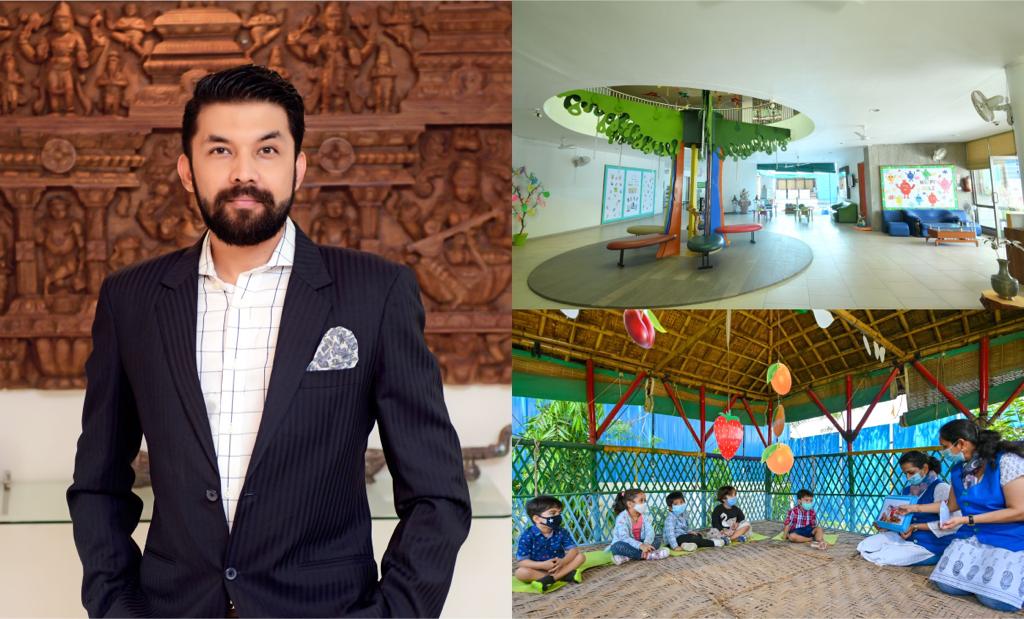Goa Institute of Management achieves an outstanding record in its campus placement performance
Durgesh Agarwal – Rethinking Early Childhood Education With Past Knowledge, Present State And Future Potential
Published on December 14, 2021
The purpose and impact of education on the economy and the broader society has been transformed through time in various ways where institutional and policy dynamics have differed across time.

The NEP, 2020 envisages to modify the existent 10+2 structure in school education to 5+3+3+4 structure, covering the age-group of 3-14 years. It is stated that the current 10+2 structure begins at age 6 – Grade I. The new policy, seeks to provide ‘a strong base of Early Childhood Care and Education (ECCE) from age 3, which is aimed at promoting better overall learning, development and well-being.
However Various pedagogical traditions have been critically reviewed and used as examples, which potentially form today’s policy, Early education cannot be seen as a detached entity from all other higher levels of education, Making Appropriate conceptual educational expertise mandatory.
BRINGING WHOLE CHILD LEARNING TO LIFE THROUGH NEP
Preschool represents a crucial point in children’s social and emotional development. Their first day of preschool is often their first experience in a large group of children of their own age, as well as their first encounter with institutionalized learning.
Little Wings Holistic Childhood Centre (LWHCC) makes this critical transition easy and is committed to nurturing happy individuals and support the growth of children’s minds, bodies, and souls, through an integrated, holistic curriculum that challenges and elevates all aspects of the child. The educational philosophy is based on the image of the child as being infinitely curious, capable of complex thinking and ripe in making connections.
With a belief that learning is an active process, LWHCC encourages children to be active participators in their own learning, The approach is inspired from best practices in early years teaching and learning with a focus on developing all important attributes of grit, empathy, collaboration and a growth mindset in children from an early age.
”We Provide everything that children need to achieve their true potential in an environment that piques their curiosity, leads them on a journey of exploration and provides them with warmth and wonder.” – Durgesh Agarwal
Over 85% of a child’s cumulative brain development occurs prior to the age of 6, indicating the critical importance of appropriate care and stimulation of the brain in the early years in order to ensure healthy brain development and growth.
There are several initiatives & methodologies that are already integral to LWHCC in compliance with the proposed policy.
- LWHCC lays more emphasis on literacy and numeracy in the first 5 preliminary years of the child’s education.
- The School has moved away from mechanical learning and focus more on skill-based learning.
- Having a 360-degree assessment pattern LWHCC includes portfolio assessment, class participation, notebooking, individual and group activities, and project-based assessments to help the students do research from their end, come to a conclusive decision and represent their learning through their project. This helps them to be more thorough with the concept and are able to comprehend way better.
- While the NEP focuses on e-resource learning, LWHCC is already do this by sharing resources with the students online as pre and post-work which helps them assimilate and understand the concepts at a wider level.
- The Institute focuses equally on scholastic and co-scholastic areas of the child so that the feedback about the child’s progress is holistic.
- The NEP is looking at providing flexibility to the students in what they want to learn.LWHCC’S curriculum is a designed in a similar way which encourages students to come up with their own answers and there is no single right answer to any question.
“We encourage students and teachers to be flexible in their thoughts and expression and help them come out of the fear of being incorrect.” – Durgesh Agarwal
- The School also promotes multi/trans-disciplinary, crosscutting concepts that help students to connect concepts across learning areas and teach them not to learn any subject in isolation.
- The examinations are based on conceptual understanding aiming to develop student’s analytical skills.
- The proprietary curriculum, of LWHCC focuses on local and global contexts that the students relate to across all learning areas as outlined in the NEP.
10- With a focus a lot on the well-being of the student community and LWHCC extends its support to Children through Parent Toddler Programs.
Last but Not the least, Little Wings Holistic Childhood Centre ideally consists of flexible, multi-faceted, multi-level, play-based, activity-based, and inquiry-based learning, comprising of alphabets, languages, numbers, counting, colours, shapes, indoor and outdoor play, puzzles and logical thinking, problem-solving, drawing, painting and other visual art, craft, drama and puppetry, music and movement. It also includes a focus on developing social capacities, sensitivity, good behaviour, courtesy, ethics, personal and public cleanliness, teamwork, and cooperation. The overall aim of the program is to attain optimal outcomes in the domains of: physical and motor development, cognitive development, socio-emotional-ethical development, cultural/artistic development, and the development of communication and early language, literacy, and numeracy.
At present, with the lack of universal access to Early Childhood Care and Education, a large proportion of children already fall behind within the first few weeks of Grade 1. LWHCC through the policy aims to ensure that all students are school-ready with a greater focus on experiential learning – a key element in international education and curriculum options, with more projects, better real-life training, more interactions and better skills. With these developments, one is left with options that are on similar levels of quality, flexibility and exposure. Little Wings Holistic Childhood centre through its initiatives is trying well to address the needs of the 21 st century and creating a student-friendly environment for their holistic development.













